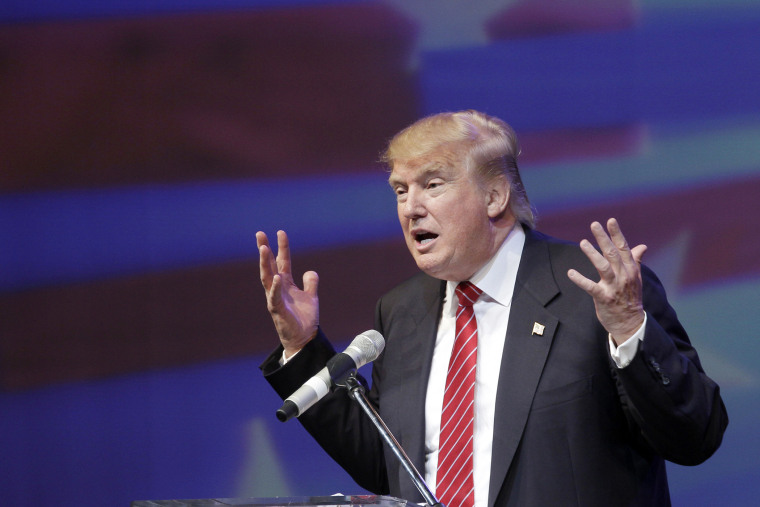For Republican insiders eagerly waiting for Donald Trump's downfall, the timing couldn't be much worse. Much of the political discussion was focused yesterday on the GOP candidate's ugly comments about Sen. John McCain (R-Ariz.), which Trump's conservative detractors hoped would be the beginning of the end of his time in the 2016 spotlight.
It was against this backdrop that a new national poll became the latest setback for the Republican Party.
Businessman Donald Trump surged into the lead for the 2016 Republican presidential nomination, with almost twice the support of his closest rival, just as he ignited a new controversy after making disparaging remarks about Sen. John McCain's Vietnam War service, according to a new Washington Post-ABC News poll.
While some recent national polling has shown Trump inching ahead of his GOP rivals, the Washington Post-ABC News poll was far more dramatic: he leads with 24% support. That's a striking figure -- in a massive field of 16 candidates, it's tough for most candidates to even reach double digits -- that no Republican has reached in any Post/ABC polls this year.
Scott Walker is in second with 15% -- that's nine percentage points behind Trump -- followed by Jeb Bush at 12%. No other candidate reached double digits. Indeed, there are four sitting U.S. senators running for president -- Marco Rubio, Ted Cruz, Lindsey Graham, and Rand Paul -- and their combined support is 19%, five points shy of Trump's total in this poll.
For Republicans waiting desperately for Trump Mania to end, the poll is a disaster. There is, however, a silver lining for the GOP establishment. From the report:
Support for Trump fell sharply on the one night that voters were surveyed following those comments. Telephone interviewing for the poll began Thursday, and most calls were completed before the news about the remarks was widely reported. Although the sample size for the final day was small, the decline was statistically significant.
The poll was conducted over a four-day period -- Thursday to Sunday -- and the controversy surrounding Trump's comments about McCain began on Saturday. It matters, obviously, that Trump's support was weaker after the uproar than before.
The result is a new round of questions: just how much backing will Trump lose? Has he built up enough of a buffer to remain in the top tier? If some of his supporters bail on Trump, which candidate(s) will they embrace?
The answers to these questions will come into focus in the next round of polling.
In the meantime, putting the McCain controversy aside, what we discussed last week remains true: these national polls are significant for reasons that have nothing do to with their predictive value. Rather, they let us know who's likely to compete in the upcoming debates, the first of which is just two weeks away.
And just as important is the fact that these polls shed light on the attitudes of the Republican base -- and as of a few days ago, quite a few GOP voters like what Donald Trump is selling. It's the sort of realization that should give Republican leaders pause about the scale of the mess they've created.
